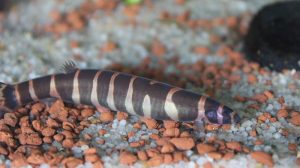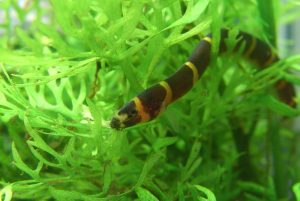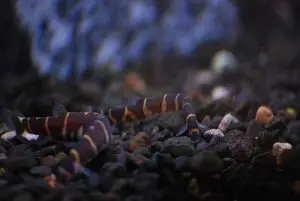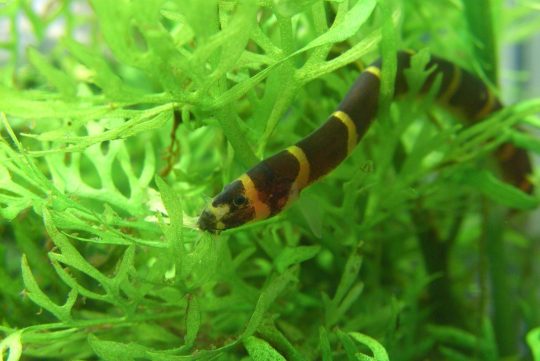The kuhli loach also known as ‘Pangio kuhlii’ is a small freshwater eel-like fish that belongs to the loach family (Cobitidae).
They come from Indonesia and from the Malay Peninsula. This creature that looks like a snake is very slender and nocturnal.
The kuhli loach can be very reclusive in an aquarium, and when startled, it will dart underneath tank ornaments or bury itself if there is a fine gravel or sandy substrate.
Short Description:
The kuhli loach is an eel-shaped fish with slightly compressed sides, round the mouth four pairs of barbels, and very tiny fins.
The dorsal fin begins in the middle of the body, and the anal fin is well behind that. The eyes have transparent skin.
The body has vertical bars of 10 to 15 dark brown to black, and the gaps between them are pink to yellow salmon, with a light underside.

The distinctions between males and females are not readily apparent when the fish is not actively breeding. Close observation, however, will reveal that males have a more muscular upper/dorsal cross-section, and their pectoral fins tend to be larger, paddle-shaped, and often have some pigment inside.
The females often grow larger than the male during breeding, and their greenish ovaries can be seen through the skin before spawning.
Spawning isn’t easy, but a few hundred greenish eggs are laid between the roots of floating plants when it occurs.
The Kuhli loaches reach maturity at 7 cm (23⁄4 inches) and have a maximum length of 10 cm (4 inches). This fish can take up to 14 years to live.
The kuhli loach’s natural habitat is the sandy beds of slow-moving rivers, and clean mountain streams.
They are a social fish and are typically found in small clusters (they don’t educate fish but enjoy their species company), but by nature they are cautious and nocturnal, and they swim near the bottom where they feed on obstacles.
They live native to a tropical climate and prefer water with 5.5 – 6.5 pH-but will tolerate 7.0 pH in aquaria, 5.0 dGH water hardness and 75 – 86 ° F (24 – 30 ° C) temperature range.
Kuhli loaches are scavengers so they’re going to eat anything that gets to the bottom. They usually feed at night, but in the home aquarium they may be taught to feed in the daytime.
Kuhli loach Names:
In 1846, Achille Valenciennes had originally described the kuhli loach as Cobitis kuhlii to commemorate the work of Heinrich Kuhl as a naturalist and zoologist.
Also commonly referred to as the coolie loach, the giant coolie loach, the slimy loach and the leopard loach.
The term Acanthophthalmus kuhlii has been referred to in scientific literature. The name of the genus Acanthophthalmus is a Pangio synonym for the junior.
In the aquarium:
In tropical aquariums the kuhli loach is commonly kept as a pet. There are a number of Pangio genus species that look similar and are sold under the same name, require similar care, and are all well suited to household tanks.
In the aquarium, they tend to be hardy and long-lived, and get along well with both their own kind and others.
In an aquarium environment , especially if the gravel is suitably finely grained, Pangio species may burrow into the bottom and for long periods of time remain unseen, emerging to eat during the night.
If the gravel is subsequently disturbed, a hobbyist might well find himself faced with fish that had long been assumed lost.
Also, Kuhlis may occasionally swim into unprotected filter inlets, which may lead to their death.Captive breeding requires plenty of concealment spaces and consistent water quality.
Taxonamy classification
| Scientific classification | |
|---|---|
| Kingdom: | Animalia |
| Phylum: | Chordata |
| Class: | Actinopterygii |
| Order: | Cypriniformes |
| Family: | Cobitidae |
| Genus: | Pangio |
| Species: |
P. kuhlii
|
| Binomial name | |
| Pangio kuhlii | |
Overview:

The Kuhli Loach (Pangio kuhlii) is part of the family Cobitidae. The Coolie Loach, the Leopard Loach or the Cinnamon Loach are also known as these.
This Loach has an eel body shape that makes them great aquarium cleaners, and they are scavengers. This Loach has an advantage over others by its size.
It rarely grows over 3-5 inches in length, and there is not much waste that they create.
Despite their small size, because they are prone to disease, they are better suited to experienced aquarists.
They have a head without scales, and are very sensitive to drugs.
If you want to keep those night owls, some experience in the treatment of scale-less fish is advised.
They ‘re priced at around $3.00 per fish, moderately.
Watch out when you buy them to always ask for their scientific names as well, so you are sure to buy the species you want.
They are often confused with cuneovirgata pangio, myersi pangio and semicincta pangio.
Could live for at least 10 years if properly cared for Kuhli Loaches.
Typical Behaviour
The Kuhli Loach is a sweet fish. Although they are not a schooling fish, some companions are more comfortable with them.
They can be very shy and if left alone in your aquarium, you’ll hardly see them.
They ‘re very quiet during the day, then they’re active at night and are commonly known as demersal fish.
That means they spend their time close to the bed of the river, scavenging food that sinks to the bottom.
They will have a similar behaviour in your aquarium. They’ll spend most of their time scavenging in the substratum at the bottom of the tank for food.
They are very curious fish, and will enjoy hiding in caves and crevices.
This fish enjoys burrowing into the sand and if you leave filter inlets unprotected (more on this later) they often swim to their death.
kuhli loach Appearance

One of the characteristics that most identifies this fish is its slender body. It is very easy, at first glance, to mistake Kuhli Loaches for eels.
Their bodies are thin and they have relatively small, difficult to see fins.
Curiously enough, they have no distinguishable lateral line. Although they do have a visible dorsal fin, it is further back than most fish.
Rather than being directly in the middle of their body, it can be found nearer to the tail on their lower third.
Most of the Kuhli Loaches are colourful. The base can color anything between brassy yellow and light pink.
The fish is slightly lighter at the underside. The fish have between 10 and 15 dark stripes, on top of that base color.
In appearance they are very similar to a tiger. The dark brown lines may go around their entire body, or stop at the belly, depending on the particular fish.
Another physical trait which stands out are the barbels of the fish. Four pairs of barbels around the mouth of the fish help it to feel about for food.
Kuhli Loaches have eyes clad in thin transparent skin. The barbels, while still able to see, help them navigate their environment a little better.
Those aren’t the only prickly things that the fish hides. A pair of sharp spines is just beneath each eye. They are barely visible, when the fish is relaxed.
The moment the Kuhli Loach is threatened, though, those spines will pop up.
It is a defense mechanism which helps to guard against predators. In case they get eaten, those spines are the last line of defense for the fish to harm attackers.
It is an unusual biological characteristic that has influenced its scientific name, Acanthopthalmus. It stands for “prickle-eye.”
The Kuhli Loach is a small fish with an eel look. In the wild, it can reach a maximum of 5 inches and will be somewhat smaller in your aquarium (usually around 3 inches).
It has 4 barbels pairs around its mouth, and small fins.
Unlike many other fish, their dorsal fin starts well beyond their middle body and their eyes are covered with transparent skin.
They usually have 10 to 15 dark vertical bars in the middle with a pinkish to yellow colour. In general the underside is lighter.
A peculiar feature is they have very weak body scales and no head scales; this feature makes them highly susceptible to disease.
When not actively breeding, the males and females look very similar. The only difference is that the males have a more muscular cross-section of the dorsal and greater pectoral fins.
When breeding, females become larger, and their ovaries can be seen before spawning through their skin.
Kuhli Loaches are often confused to other Loaches.
The Pangio oblonga, Pangio myersi, Pangio cuneovirgata, Pangio semicincta, Pangio shelfordii and the Pangio robiginosa can be found in the same Loaches group (Pangio).
The black varieties are completely black or dark brown in shape and size very similar to the Kuhli Loach. They are among the varieties that are most sought after.
Also known as the Kuhli Loach chocolate, they can achieve a maximum size of 3.2 inches.
In terms of size and behavior this variant is pretty much the same as the normal kind, although there is one big difference. The Kuhli Loach black has a different colour.
Can you guess what they are?
Yup, Kuhli Loaches black were indeed pretty much black (or dark brown) from head to toe. This is quite a difference from the normal kind, so obviously it’s an attractive option for aquarists who want to mix it up a bit.
How Big are kuhli loaches?
Kuhli Loaches grow up to a maximum of 5 inches but they are more likely to grow up to 3-4 inches in your aquarium.
Water conditions for kuhli loaches
Kuhli Loaches, as with any fish, do best in aquariums that mimic their natural habitats. Those fish live in slow-moving tropical rivers.
It is therefore preferable to have warmer temperatures between 73 and 86 degrees Fahrenheit.
Kuhli Loaches like a little more acidity when it comes to water quality than other species. It is best to have a pH balance between 5.5 and 6.5 Also the water should have a hardness of no more than 5.0 dGH.
Additional Tank info:
Many fish-enthusiasts have had problems with the equipment for aquariums. Don’t let Kuhli Loaches docile nature fool you.
If chance is given, they can get into some trouble. One significant concern on aquarium filters is the inlet tube.
It should be clad in a fine mesh. If not, your Kuhli Loach may wriggle its way into it and get trapped in the filter. This could prove to be a fatal error, depending on the design of your filter!
Make sure you have a secure lid, as well. These fish were known to jump straight out of the tanks when you least expect them.
Go on with a smooth substrate to the bottom of your tank. Kuhli Loaches adore burrowing down. Large, jagged pebbles can have their delicate scales cut through. Fine sand is the best option. Yet smooth pebbles can also work.
As for decorations, provide plenty of hiding places for your fish. Rocks, driftwood, manufactured caves, and live plant collections should do the trick.
Wild fish tend to be kept in shallow waters, filled with plant life. They can make all the difference in their quality of life by introducing things like peat moss, java ferns and other live plants.
Behaviour and temperature
Kuhli Loaches, notwithstanding their eye-catching looks, are not about attention. They prefer staying beneath the radar.
This is especially true when other similar species aren’t around them. They can be a bit shy and reclusive when they’re alone.
Kuhli loach shy Even if you have others around you, don’t expect to see them a lot during the day. They tend to remain quiet and look for hiding spots.
Once the sun goes down, they will become more active and start scavenging for food near their surrounding floor.
Kuhli Loaches spends their time in their natural wild habitats burrowing in riverbeds and sifting for food. The same conduct occurs in aquariums.
They are bottom-dwellers, so you won’t very often find your Kuhli swimming up to the water surface.
The Kuhli Loaches are very mellow when it comes to temperament. They are peaceful fish and so long as they are left alone, they get along with other creatures.
This fish has sharp spikes to defend themselves with as we mentioned earlier. They typically don’t use them, though, unless they have a good reason for doing so.
Habitat and tank conditions
kuhli loach is found in South-East Asia, Malaysia, Sumatra and Borneo. The full extent of their distribution remains, however, unclear.
They inhabit the shallow, slow-moving waters of forest streams; an environment similar to old, black-water peat swamps.
These habitats are often shaded by the dense vegetation of streams and the tree canopy above the water due to the direct sunlight.
Waters can be very acidic, with a pH as low as 3.0-4.0, with very low mineral content due to the decaying organic materials such as plants.
The substratum of the river bed can vary from peat to mud or sand in different places.
Setup of tanks
Holding the water clean and well-oxygenated is very important.
Kuhli Loaches require a soft substrate like mixture of sand and fine gravel. The water should be soft, slightly acidic, 0-5 dGH, pH 5.5-6.5, with moderate light.
They are tropical fish and should maintain temperature between 73-86 ° F.
We suggest a gravel filter underneath to improve oxygenation and reduce waste. With a turnover of at least 10 times per hour, they prefer good water movement; you will need a good quality filter for this.
Any filter you ‘re using will need a cover over the outlet and inline pipe to keep your Loach from swimming inside and getting trapped.
They are used to plenty of vegetation in the wild so include plants like Cryptocoryne and Java Fern.
Loaches like to spend time in leaf litters in the wild, so you can spread peat moss within the aquarium to recreate this.
Some large rocks and a few pieces of driftwood may also be used as tank decoration; twisted roots will also be appreciated as a place to hide.
Make sure that your tank has a firm cover as these fish can jump out of the tank.
Kuhli loach tank size:
They require a minimum 20 gallon aquarium. Allow 3-5 gallons of water you add to your tank for each Loach.
Kuhli loach tank mates:
Kuhli Loaches are tranquil fish. They are best kept along with other non-aggressive small fish like Corydoras, Danios, Rasboras and Tetras.
They ‘re going to spend most of their time swimming at the bottom of the tank, scavenging and eating the remaining food that’s sunk on the sand. c
Those fish which occupy the upper regions of the tank are therefore ideal tank mates.
Like the Red Cherry Shrimp, White Cloud Mountain Minnows, Oto Catfish and shrimps are indeed good tank mates.
Peaceful pelagic fish like Gouramis are also ideal companions in tanks. Pelagic fish spend the majority of their time swimming close to the middle or water tank surface.
Do not keep your Loaches with other big territorial fish like Cichlids and Arowanas. Fish and bullies like Tiger Barbs, Chinese Algae Eaters and Angelfish are other big no-no’s.
Blue Gouramis, Bettas and Red-Tailed Sharks are not great compañeros either. They are very territorial and this can ultimately cause your Kuhli stress.
Do not keep them with snails, at last. Your Loaches are going to try and eat them.
you can also add clown pleco fish with kuhli loach.
Kuhli loach feeding
Kuhli Loach are omnivorous fish, larvae eating, small crustaceans and plant material found on the bed of the river.
In search of food they usually sieve through substrate mouthfuls. They don’t actively chase for food but are known as scavengers instead. They’ll wait for the food to sink from the above water and then look for it to eat.
It will eat most of the food you feed to them, whether frozen or live.
They do prefera a meat-based diet, although they are not fussy. You can also feed them with vegetables and fish flakes or pellets to provide them with a balanced diet.
Flakes and pellets are ideal because they will easily sink down to the substrate and your eels will eat them easily – these foods should form the basis of your Loaches diet.
You can feed Loaches Daphnia, Artemia, Bloodworms, Microworms and Grindal Worm into your aquarium.
There are many homemade recipes that you can try to provide them with a balanced diet, too.
You should feed them several times a day, just as much as they can eat in two to three minutes.
Read this nice article about oscar fish.
Kuhli loach care:
Unfortunately these fish are more susceptible to disease; this is because they do not have head scales and very weak body scales.
When introducing those fish to an established community, you should be careful.
They are highly sensitive to the various medicines used to treat diseases, and some diseases require changes in water temperature along with medication that can cause further stress to this fish and make it more prone to disease.
The most common disease is known as Ich or White Spot Illness. Most aquarium fishes are susceptible to infection and often the first to be attacked are Loaches.
Another common problem are parasites that can cause the so-called skinny disease. If your fish eats healthy, and still appears to lose weight, a parasite is likely to affect it. This can be carefully treated with various medications.
Prevention is the key to a successful aquarium when conserving such a sensitive type of fish. Try to maintain good water quality and a well-balanced diet with a proper environment that suits their needs.
Kuhli Loach Breeding
Breeding Kuhli Loaches can be very challenging but it can be done by setting up a breeding tank with the following parameters.
Keep very dim light on low water levels. Females will lay their eggs using floating plants, and dense vegetation will also help promote spawning. With a pH of 6.5 the water hardness should be lowered.
The more comfortable the Loach is the more likely they will spawn in your aquarium. Kuhli Loaches are common spawners, and thus the chances of spawning will be increased if kept within a community of their own species.
To encourage spawning, plenty of food is also always appreciated; live foods are often the best for that.
You’ll need to be patient with your fish, as Kuhli Loaches only reaches sexual maturity at age 2.
Females become very big when they lay their eggs. You can occasionally see the eggs through their skin.
When the females are ready to spawn, bright green colored eggs will be released that will attach to the underside of your floating plants.
The fry and the eggs are likely to be eaten by adult fish so make sure you remove the adults when the eggs are laid.
Some 24 hours later, the eggs hatch. Infusoria or brine shrimp may be used to feed the fry. Commercially prepared fry food is also suited as a first-time meal.
As we mentioned earlier, raising these fish is extremely difficult so don’t be disheartened if they don’t raise.
Do Kuhli Loaches fit for your aquarium?
Kuhli Loaches are freshwater small fish. They are a nocturnal animal, if not kept within a small group of the same species, which will shy away.
During the night they ‘re lively so keep a tight cover on your tank or they might try to escape!
This fish requires a bit of attention because they are very prone to disease if they are not kept in the right environment with good oxygenation and frequent changes in water.
Breeding these fish is not easy, but if you are successful, it can be very rewarding for this reason.


purple pharmacy mexico price list: mexican pharmacy online – medication from mexico pharmacy
mexican pharmaceuticals online
https://cmqpharma.online/# buying prescription drugs in mexico online
reputable mexican pharmacies online
Very interesting info!Perfect just what I was searching for!Blog monetyze
real canadian pharmacy reputable canadian online pharmacies real canadian pharmacy
buy medicines online in india: india pharmacy mail order – buy prescription drugs from india
http://foruspharma.com/# reputable mexican pharmacies online
buy prescription drugs from india: mail order pharmacy india – Online medicine order
pharmacies in mexico that ship to usa mexican pharmacy mexico pharmacy
medication canadian pharmacy: canadian pharmacy prices – canadian pharmacy meds
mexican mail order pharmacies: mexican pharmaceuticals online – mexican pharmaceuticals online
https://indiapharmast.com/# indianpharmacy com
indian pharmacy online п»їlegitimate online pharmacies india buy prescription drugs from india
Online medicine order: indian pharmacies safe – buy prescription drugs from india
best online pharmacies in mexico: buying prescription drugs in mexico – mexico drug stores pharmacies
top 10 pharmacies in india: indian pharmacy online – top 10 pharmacies in india
reputable mexican pharmacies online: mexico drug stores pharmacies – mexican mail order pharmacies
buy canadian drugs canadianpharmacyworld canadian world pharmacy
http://foruspharma.com/# mexican drugstore online
canadapharmacyonline: canadian world pharmacy – safe online pharmacies in canada
india pharmacy mail order: indian pharmacy paypal – reputable indian online pharmacy
mexican drugstore online: best online pharmacies in mexico – mexican pharmacy
http://ciprodelivery.pro/# buy cipro online without prescription
doxycycline 2985: doxycycline 50mg tablets price – doxycycline online singapore
https://ciprodelivery.pro/# ciprofloxacin 500 mg tablet price
http://ciprodelivery.pro/# buy cipro online without prescription
https://clomiddelivery.pro/# can you buy cheap clomid without rx
http://amoxildelivery.pro/# generic amoxicillin 500mg
http://ciprodelivery.pro/# where can i buy cipro online
https://doxycyclinedelivery.pro/# doxycycline 100mg for sale
http://amoxildelivery.pro/# buy amoxicillin 500mg usa
http://ciprodelivery.pro/# ciprofloxacin 500 mg tablet price